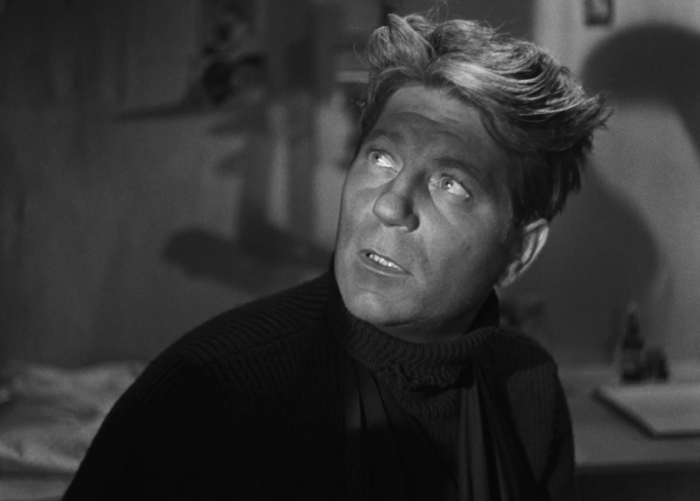
When we first announced our Criterion picks for this year on our podcast , I wondered if you could pick ten films from the Criterion Collection about prison. So I tested this idea. Here’s what I found:
La Grande Illusion (1937)
Brute Force (1947)
Riot in Cell Block 11 (1954)
A Man Escaped (1956)
Le Trou (1960)
The Great Escape (1963)
Merry Christmas Mr. Lawrence (1983)
Down By Law (1986)
Hunger (2008)
That’s nine. Ten if you count Michael Bay’s The Rock because it’s set at Alcatraz. Why bother with all of this? Who would want to pick ten prison movies? This guy (points at myself). Take away a character’s props and their locations and what do you have? Survival. The human spirit looking for a window only to find those windows have bars. Drama at its best. My favorite prison movies aren’t the gritty ones (though I do like those). My favorite prison movies are about camaraderie. Movies about people banding together to face off against insurmountable odds, fighting for freedom. La Grande Illusion AKA The Grand Illusion is that kind of movie.
Based on British journalist Norman Angell’s 1909 novel, The Grand Illusion is about two French aviators shot down in Germany during WWI. Maréchal (Jean Gabin), is a working-class salt of the earth kind of guy, while Boëldieu (Pierre Fresnay) is a more refined and upper-class soldier. It’s like The Odd Couple if they were prisoners of war.
The pair are set to be transferred to a prison camp, but before that are invited to a lunch with commanding officer Rittmeister von Rauffenstein (Eric von Stroheim). Despite being on opposite sides, Rauffenstein finds he and Boëldieu had many mutual friends within their social circles before the war. But orders are orders and Rauffenstein sends them away.
The men are taken to a camp where they meet a lighthearted group of French soldiers who pass their time doing vaudeville shows and having dinner parties with whatever morsels they can pry from tin cans. They seem happy. Yeah, right. They’re totally digging a tunnel. Hell yeah.
Still, the men don’t fear their surroundings. Not until another man in the camp is shot in an escape attempt and the grim reality sets in that they might all die as prisoners. Maréchal rallies the prisoners after a victory on the French lines but is sent to solitary confinement. He starts to lose his grip but is released when the prisoners are informed they will al be sent to other camps. They didn’t even get to use that ding dang old tunnel.
Boëldieu and Maréchal are sent to a fortress in the mountains where they are reunited with Rauffenstein, resigned to the role of prison warden after being injured in battle. Told that the prison is escape-proof, Boëldieu volunteers to distract the guards while Maréchal and another prisoner Rosenthal (Marcel Dalio) escape via a rope from a window. Boëldieu is shot and spends his last moments with Rauffenstein, who is distraught over losing someone much like himself, despite being on the enemy side.
Maréchal and Rosenthal escape into the countryside and befriend a German woman named Elsa (Dita Parlo). Maréchal falls in love but knows he has to keep moving. He vows to come back for her but is chased by German patrols into a snow-covered valley near Switzerland. Maréchal and Rosenthal are last seen trudging through the snow in the distance. Do they make it? That’s for you to decide.
I didn’t mean to walk through the whole plot like that but it’s a simple movie. At least in terms of the plot. What makes it special is the time spent in-between the action. This is one of the few (if only) war movies I’ve ever seen that makes an effort to make both sides sympathetic. Rauffenstein doesn’t hate his “enemy”. He’s scared that if he can’t serve his country he’s of no use, particularly after his injury.
Maréchal and Boëldieu are equally indifferent to the “threat” they face. They treat the prison camp in the first half of the film like it’s a summer camp. Only when reality sets in that at some point these sides will need to kill each other do they realize the reality of war. Which leads me to the title of the film.
“The Grand Illusion” in this story refers to war itself. These countries fight each other to achieve peace, but what’s peace to one side isn’t peace to another side. Each side has its own economic interests that clash with other economic interests. There isn’t a scenario where everyone comes out on top. Someone has to lose. Maybe everyone loses.
The Grand Illusion is one of the more philosophical war and prison movies I’ve seen. It’s not a story of heroes and villains. Most of the film’s runtime isn’t spent watching guys fight or shit getting blown up. It’s watching friends sing songs, or talk over dinner about what they did before the war and what they hope they can do if it ever ends. And we see these events played out through the eyes of a lower-class person, a higher-class person, and a higher class person on the opposite side. All different and yet all with the same questions “What’s all of this going to accomplish? When can we move on? Can we move on?”
That’s why I could have spent all of Criterion Month watching prison movies. The struggle to break free from one’s trappings is endlessly compelling. It’s a theme I could revisit time and time again. Maybe next year Criterion will put another prison movie in the collection. Fingers crossed for Escape Plan.




